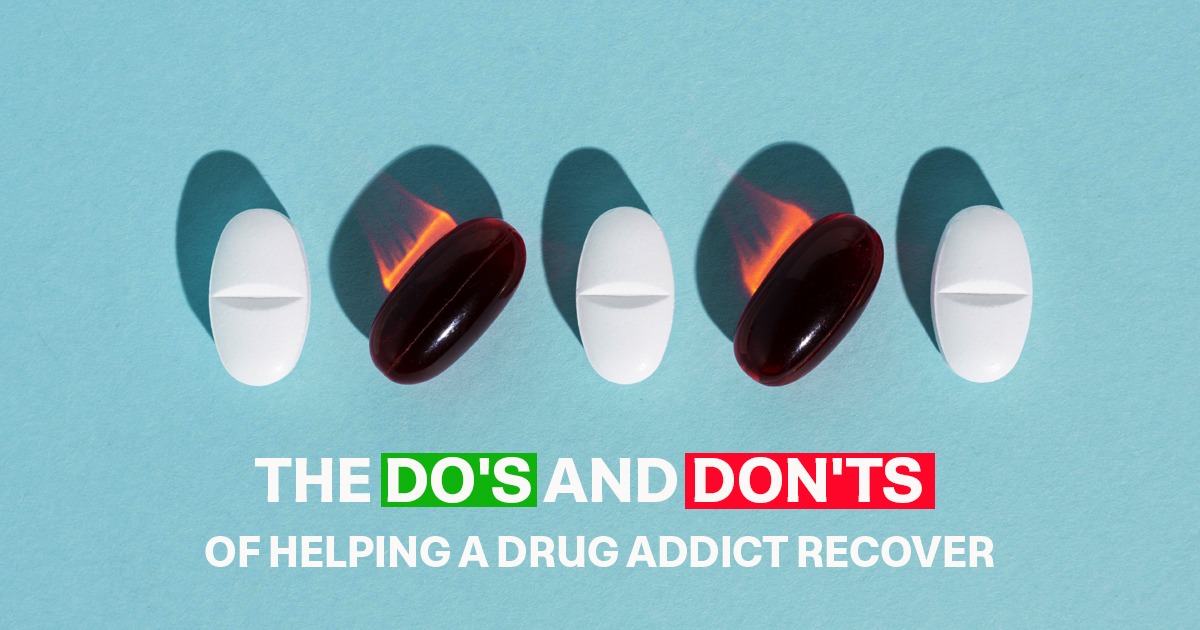
When someone you love is struggling with active addiction or is in recovery, you always want to do your best to help them. Helping a drug addict recover can quickly turn into enabling, however. That transition to enabling is why it’s important to learn the dos and don’ts in these situations.
The following are some ways to begin helping a drug addict recover, what to say to a recovering addict, and what not to say to someone in recovery from addiction to alcohol or drugs.
Helping During Active Addiction
The person you love and care about may not be in recovery from substance use disorders yet. They may be active in addiction and potentially dealing with a mental health disorder or other associated medical conditions. In that situation, the following are some things you can do to help:
- Learn as much as you can about the disease of addiction and addictive substances. Addiction is complex, and the more you learn, the more you can understand some of the things your loved one might be going through. You’ll also be more prepared with information about treatment, which you may be able to use to help encourage them.
- Offer support. Sometimes it’s best not to try and offer advice, but instead, just share your concerns and be someone who listens when your loved one wants to talk.
- You can encourage someone to consider treatment centers, and you might even research different drug addiction treatment options to tell them more. Don’t make someone feel ashamed or guilty, but persistence can be a good thing in these situations as you discuss treatment programs.
- If your loved one does decide to go to treatment, you should stay involved in the process. Recovery is something long-term and ongoing, and your friend or family member is going to need your support each step of the way, according to the National Institute on Drug Abuse. You can help them work out logistics if they decide on an inpatient treatment program, such as going over the details of health insurance plans with insurance companies.
- Don’t neglect your own needs and self-care. If you aren’t taking care of yourself, you will be a positive support system.
- Don’t feel guilty or responsible for the behavior of anyone else. It’s in no way your fault when someone has a substance abuse disorder. They need medical treatment that you can’t provide.
- Try to avoid threats or lectures. Addiction is not a moral failing. Addiction is a chronic illness, and it’s essential to keep that in mind.
- Emotional appeals don’t tend to work well when someone is in active addiction. Instead, they can have the opposite effect of making the person feel more guilt or shame.
- Don’t try and help your loved one avoid the negative consequences of their actions. These actions are enabling.
- If your loved one is under the influence of drugs or alcohol at any given moment, don’t try to argue or rationalize with them at that time.
Avoiding Codependency
Codependency and enabling tend to go hand in hand, and it’s a complex issue. When you’re codependent, you try to help someone manage their addiction struggles. You are trying to help genuinely, but in doing so, you’re saving the person from the consequences. An addicted person needs to feel those consequences of understanding they need help.
If there’s codependency happening, you might try to control someone else’s drug or alcohol use, which isn’t possible. You may also neglect your self-care and instead put the needs of the addicted individual first.
To end codependency, do the following:
- No matter how hard it is, let the person you love face the consequences of their actions.
- If your loved one is responsible for something, let them sort it out.
- Don’t feel guilty about someone else’s substance abuse.
- Suggest treatment.
- Commit to taking care of yourself first and foremost. There are resources for family members of addicts that may be helpful for you as well, such as support groups.
How Can I Help a Recovering Addict?
Once someone has gone to treatment and is in recovery, you may be wondering how you can continue to be a sound support system for them.
First, don’t be judgmental. You want whoever the person is to know that you support them without criticism or negativity. You can do things together that promote a healthy lifestyle. For example, maybe you schedule times each day to go for walks or prepare nutritious meals together. Self-care will help both of you.
Work on helping them have a healthy life and substance-free environment in their recovery process. Be attentive and provide a listening ear to the person in recovery. You might go to 12-step program meetings sometimes with the person or accompany them to behavioral therapy sessions.
As difficult as it can be, try and stay patient when dealing with people with addiction disorders who are in recovery. Addiction recovery is full of challenges. Just because someone is out of treatment and sober, it doesn’t mean things will be easy, especially early on. There may also be a lot of pain and resentment between the two of you in your relationship but try to avoid letting this get the best of you. You’ll have time to work on these issues in more productive ways, such as family therapy or relationship therapy.
Celebrate even small successes and massive ones, like a sobriety anniversary as someone works through recovery from substance use.

What to Say to a Recovering Addict
Finding the words to talk to a recovering addict can be challenging, but your words are powerful.
Some of the things to say to someone in recovery include:
- I love you: People on the road to recovery are dealing with the weight of a lot of guilt and shame. They may feel like they aren’t worthy of your continued love, so reaffirm that you do indeed care about them.
- I’m here for you: A support system is integral to long-term sobriety and recovery. You can be that support system by simply letting the person know that they aren’t alone and you are there for them. They don’t have to suffer in silence.
- How are you: Checking in with someone in recovery is a simple yet effective thing you can do to reduce their risk of relapse. Just ask them how they’re doing overall as they navigate a new life.
- Can I help you: There may be ways that someone in recovery could need help. For example, maybe you could help them by participating in a healthy activity like yoga with them.
- I’m proud of you: Someone who’s in recovery has come so far and done so much work, so verbalize that you recognize that, and you feel pride in everything they’re achieving.
What Not to Say to a Recovering Addict
Like positive words can have power to a recovering addict, so can other things but in the opposite way. Many of us are well-intentioned, but we may say things that aren’t productive for long-term recovery.
Some of the things not to say to a recovering addict include:
- I know what you’re going through: Don’t say this unless you’re also an addict in recovery because even though you’re trying to empathize, you’re minimizing what the person is going through.
- When will you be cured: The idea of curing an addiction is something that’s not realistic. Instead, recovery is a lifelong process, but if you talk about your loved one being “cured,” it can be discouraging.
- Can you ever drink/use drugs again: People in recovery don’t need to even think about or visualize what it might be like for them to use again. Don’t bring up the topic Focus on other things, such as the positive elements of their sober life.
- Remember when ___: Don’t reminisce on times when your loved one was drinking or using drugs. People in recovery who were drug users or who had alcohol addiction tend to glorify their substance use before a relapse, so don’t promote that.
Overall, the best things you can do to help someone in recovery are to be supportive, a good listener, and get involved with activities that can help them stay sober.
If you’d like to learn more about rehab options, the team at Carefrontations is available and ready to answer questions about treatment facilities and effective treatment for an alcohol use disorder, opioid addiction, or another type of drug addiction; just call 844-588-3267 for more information.


3 Comments
It helped that you mentioned how you shouldn’t make them feel guilty or ashamed when encouraging them to consider getting treatment for substance abuse. My uncle is an alcoholic and it’s taking quite a toll on his overall health, so we’re planning to get him to a treatment center so he can recover properly. We’ll have to look into trusted services within our area so he can see and consider all his options.
I loved what you said about just checking in on someone in addiction recovery. My daughter is in a recovery house from her heroin addiction and it’s been really hard for her. I’m hoping that I can find other ways to support her during this difficult time.
Thank you for explaining how it’s important to not to be judgmental when helping a drug addict recover. I’ve been wondering how to support my son through his drug addiction. I’ll be sure to keep this in mind when figuring out what steps to take.